英语四年级英语
4年级英语名词大全

4年级英语名词大全1. 人•Teacher (老师)•Student (学生)•Parents (父母)•Friend (朋友)•Family (家庭)•Classmate (同学)•Neighbor (邻居)•Baby (婴儿)•Child (孩子)•Doctor (医生)•Singer (歌手)•Actor (演员)•Writer (作家)•Cook (厨师)•Athlete (运动员)•Musician (音乐家)•Artist (艺术家)•Police officer (警察)•Farmer (农民)•Engineer (工程师) 2. 动物•Cat (猫) •Dog (狗) •Fish (鱼) •Bird (鸟) •Rabbit (兔子) •Mouse (老鼠) •Tiger (老虎) •Lion (狮子) •Elephant (大象) •Giraffe (长颈鹿) •Monkey (猴子) •Panda (熊猫) •Bear (熊) •Horse (马) •Cow (牛) •Sheep (羊) •Pig (猪) •Duck (鸭子) •Chicken (鸡) •Frog (青蛙)•Book (书) •Pen (钢笔) •Pencil (铅笔) •Bag (书包) •Computer (电脑) •Desk (桌子) •Chair (椅子) •Table (桌子) •Notebook (笔记本) •Eraser (橡皮擦) •Ruler (尺子) •Globe (地球仪) •School (学校) •Playground (操场) •Toy (玩具) •Bicycle (自行车) •Ball (球) •Television (电视) •Clock (时钟) •Bed (床)•Apple (苹果) •Banana (香蕉) •Orange (橙子) •Strawberry (草莓) •Watermelon (西瓜) •Bread (面包) •Rice (米饭) •Noodles (面条) •Soup (汤) •Egg (鸡蛋) •Milk (牛奶) •Juice (果汁) •Pizza (披萨) •Hamburger (汉堡包) •Ice cream (冰淇淋) •Chocolate (巧克力) •Candy (糖果) •Cookie (饼干) •Cake (蛋糕) •Salad (沙拉)•Library (图书馆)•Park (公园)•School (学校)•Home (家)•Beach (海滩)•Restaurant (餐厅)•Store (商店)•Hospital (医院)•Museum (博物馆)•Stadium (体育馆)•Farm (农场)•Zoo (动物园)•City (城市)•Country (国家)•Mountain (山)•Lake (湖)•River (河流)•Bridge (桥)•Forest (森林)•Market (市场)这是一个简单的4年级英语名词大全,列举了人、动物、物品、食物和地方等方面的常见名词。
四年级的所有英语单词
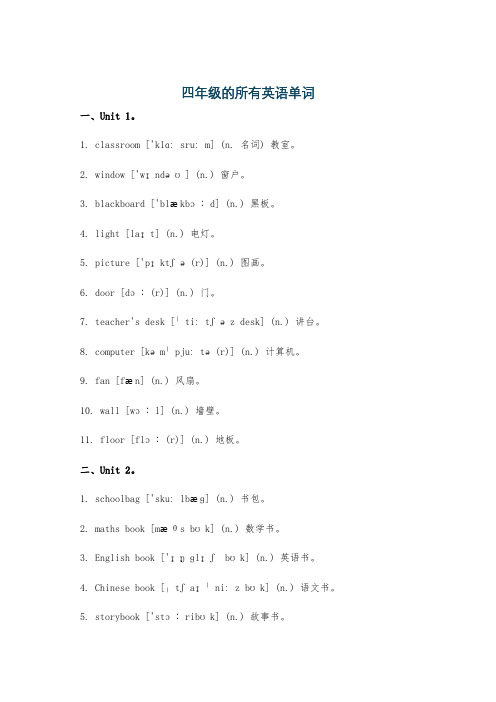
四年级的所有英语单词一、Unit 1。
1. classroom ['klɑːsruːm] (n. 名词) 教室。
2. window ['wɪndəʊ] (n.) 窗户。
3. blackboard ['blækbɔːd] (n.) 黑板。
4. light [laɪt] (n.) 电灯。
5. picture ['pɪktʃə(r)] (n.) 图画。
6. door [dɔː(r)] (n.) 门。
7. teacher's desk [ˈtiːtʃəz desk] (n.) 讲台。
8. computer [kəmˈpjuːtə(r)] (n.) 计算机。
9. fan [fæn] (n.) 风扇。
10. wall [wɔːl] (n.) 墙壁。
11. floor [flɔː(r)] (n.) 地板。
二、Unit 2。
1. schoolbag ['skuːlbæɡ] (n.) 书包。
2. maths book [mæθs bʊk] (n.) 数学书。
3. English book ['ɪŋɡlɪʃ bʊk] (n.) 英语书。
4. Chinese book [ˌtʃaɪˈniːz bʊk] (n.) 语文书。
5. storybook ['stɔːribʊk] (n.) 故事书。
6. candy ['kændi] (n.) 糖果。
7. notebook ['nəʊtbʊk] (n.) 笔记本。
8. toy [tɔɪ] (n.) 玩具。
9. key [kiː] (n.) 钥匙。
三、Unit 3。
1. strong [strɒŋ] (adj. 形容词) 强壮的。
2. friendly ['frendli] (adj.) 友好的。
3. quiet ['kwaɪət] (adj.) 安静的。
小学四年级英语单词大全

⼩学阶段的英语最重要的不是能背多少单词,⽽是能说多少英语。
以下是店铺整理的⼩学英语单词⼤全中的四年级英语,欢迎阅读。
四年级上册英语单词 Unit 1 Window(窗户) board(板) light(灯) picture(图⽚) door(门) floor(地板) classroom (教室) computer(电脑) teacher’desk(讲台) wall(墙) fan(扇⼦) Unit 2 bag(包) pencil(铅笔) pen(钢笔) book (书) ruler(尺⼦) pencil-case(铅笔盒) Unit 3 teacher(教师) student(学⽣) boy(男孩) girl(⼥孩) friend(朋友) Unit 4 home(家) room(房间) school(学校) classroom(教室) window(窗户) desk(课桌;书桌) door(门) chair(椅⼦) bed(床) Unit 5 rice(⽶饭) beef(⽜⾁) bread(⾯包) milk(⽜奶) egg(蛋) water(⽔) chicken(鸡⾁) fish(鱼) Unit 6 sister(姐妹) brother(兄弟) father(⽗亲;爸爸) mother(母亲;妈妈) driver(司机) doctor(医⽣) farmer(农民) nurse(护⼠) 四年级下册英语单词 Unit 1 computer(计算机) board(写字板) fan(风扇) light(灯) this(这;这个) is(是) my(我的) that(那;那个) your(你的) teacher’s desk(讲台) picture(图画;照⽚) wall(墙壁) floor(地板) yes(是;是的) it(它) Unit 2 one(⼀) two(⼆) three(三) four(四) five(五) six(六) seven(七) eight(⼋) nine(九) ten(⼗) what(什么) time(时间) it’s=it is …o’clock(…点钟) math(数学) Chinese(语⽂) English(英语) P.E.(体育) music(⾳乐) for(为;给) class(课程) Unit 3 jacket(夹克衫) shirt(衬衫) skirt(裙⼦) dress(连⾐裙) T-shirt(T恤衫) red(红⾊的) blue(蓝⾊的) yellow(黄⾊的.) green(绿⾊的) white(⽩⾊的) no(不;不是) not(不;不是的) colour(颜⾊) Unit 4 warm(暖和的) cold(寒冷的) cool(凉爽的) today(今天) jeans(⽜仔裤) pants(长裤) socks(袜⼦) shoes(鞋⼦) let’s=let us play(玩;踢) football(⾜球) snowy(下雪的) sunny(晴朗的) Unit 5 how much(多少钱) big(⼤的) small(⼩的) long(长的) short(短的) apple(苹果) banana(⾹蕉) pear(梨) orange(橙⼦) watermelon(西⽠) are(是) they 它(他、她)们 Unit 6 horse(马) aren’t=are not cat(猫) rabbit(兔⼦) pig(猪) duck(鸭⼦) dog(狗) eleven(⼗⼀) twelve(⼗⼆) thirteen(⼗三) fifteen(⼗五) twenty(⼆⼗) how many(多少) there(那⼉;那⾥)【⼩学四年级英语单词⼤全】。
小学四年级上册英语

四年级上册 Unit 1一、词汇classroom /'klɑ:sru:m/ 教室window /'wɪndəʊ/ 窗户blackboard /'blækbɔːd/ 黑板light /laɪt/ 灯,灯管picture /'pɪktʃə(r)/ 画,图画door /dɔː(r)/ 门teacher’s desk /'ti:tʃəzdesk/ 讲台computer /kəm'pju:tə(r)/ 计算机,电脑fan /fæn/ 扇子,电扇wall /wɔ:l/ 墙floor /flɔ:(r)/ 地板really /'rɪəlɪ/ 真的,真实的near /nɪə(r)/ 在……的旁边TV /'ti:'vi:/ 电视clean /kli:n/ 打扫,清洁,擦干净的help /help/ 帮助,有帮助的四年级上册 Unit 2一、词汇schoolbag /ˈsku:lbæg/ 书包maths book /mæθs/ 数学书English book /ɪŋglɪʃ/ 英语书Chinese book /ˌtʃaɪ'ni:z/ 语文书storybook /'stɔ:ribʊk/ 故事书candy /'kændi/ 糖果notebook /'nəʊtbʊk/ 笔记本toy /tɒɪ/ 玩具key /key/ 钥匙wow /waʊ/ 哇lost /lɒst/ 丢失(lose的过去式形式)so much /səʊ mʌtʃ/ 非常地cute /kjuːt/ 漂亮的,聪明的,伶俐的四年级上册 Unit 3一、词汇strong /strɒŋ/ 健壮的friendly /'frendli/ 友quiet /'kwaɪət/ 安静的hair /heə/ 头发shoe /ʃuː/ 鞋子glasses /'glɑːsɪz/ 眼镜his /hɪz/ 他的or /ɔː/ 或者right /raɪt/ 对hat /hæt/ 帽子her /hə(r)/ 她(宾格);她的四年级上册 Unit 4一、词汇bedroom /'bedrum/ 卧室living room /'lɪvɪŋ//ru:m/ 客厅study /'stʌdi/ 书房kitchen /'kɪtʃin/ 厨房bathroom /'baθrum/ 卫生间bed /bed/ 床phone /fəʊn/ 电话table /'teɪbl/ 桌子sofa /'səʊfə/ 沙发fridge /frɪdʒ/ 冰箱find /faɪnd/ 发现them /ðəm/ 他们(宾格)四年级上册 Unit 5一、词汇beef /bi:f/ 牛肉chicken /'tʃɪkɪn/ 鸡肉noodle(s) /'nu:dlz/ 面条(复数)soup /su:p/ 汤vegetable /'vedʒtəbl/ 蔬菜chopsticks /'tʃɒpstɪks/ 筷子(复数)bowl /bəʊl/ 碗fork /fɔ:k/ 叉子knife /naɪf/ 刀spoon /spu:n/ 勺子dinner /'dɪnə/ 晚餐;正餐ready /'redi/ 准备好了help yourself /help//j'self/ 随便吃pass /pɑ:s/ 传递try /traɪ/ 尝试;试一下四年级上册 Unit 6一、词汇parents/'perənts/ 父母cousin /'kʌz(ə)n/ 堂兄(弟)uncle /'ʌŋkl/ 叔叔;舅舅aunt /ɑ:nt/ 姑姑;婶;姨baby brother /'beɪibi/ /'brʌðə(r)/ 婴儿小弟弟doctor /'dɒktə(r)/ 医生cook /kʊk/ 烹调driver /'draɪivə(r)/ 司机farmer /'fɑ:mə(r)/ 农民nurse /nɜ:s/ 护士people /'pi:pl/ 人but /bʌt/ 但是little /'lɪt(ə)l/ 小的puppy /'pʌpi/ 小狗football player /'fʊtbɔ:l//'pleɪə(r)/ 足球运动员job /dʒɒb/ 工作basketball /'bɑːskɪtbɔːl/ 篮球。
小学四年级英语
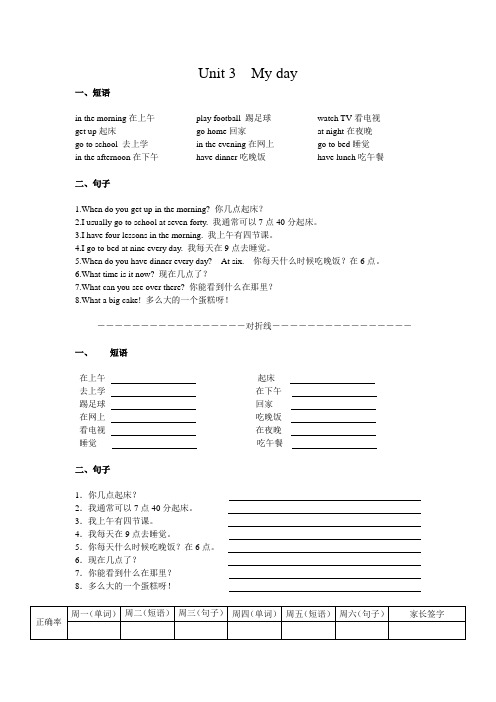
Unit 3 My day 一、短语in the morning在上午get up起床go to school 去上学in the afternoon在下午play football 踢足球go home回家in the evening在网上have dinner吃晚饭watch TV看电视at night在夜晚go to bed睡觉have lunch吃午餐二、句子1.When do you get up in the morning? 你几点起床?2.I usually go to school at seven forty. 我通常可以7点40分起床。
3.I have four lessons in the morning. 我上午有四节课。
4.I go to bed at nine every day. 我每天在9点去睡觉。
5.When do you have dinner every day? At six. 你每天什么时候吃晚饭?在6点。
6.What time is it now? 现在几点了?7.What can you see over there? 你能看到什么在那里?8.What a big cake! 多么大的一个蛋糕呀!-----------------对折线----------------一、短语在上午起床去上学在下午踢足球回家在网上吃晚饭看电视在夜晚睡觉吃午餐二、句子1.你几点起床?2.我通常可以7点40分起床。
3.我上午有四节课。
4.我每天在9点去睡觉。
5.你每天什么时候吃晚饭?在6点。
6.现在几点了?7.你能看到什么在那里?8.多么大的一个蛋糕呀!Unit 4 Drawing in the park 一、短语good idea! 好主意over there在那里some flowers一些花draw them 画它们well done干得好on the river在河上make a cake做蛋糕this big box 这个大盒子have a look 看一看on the lake 在湖面try again 再试一次ten to ten 9点50点before ten 10点前in the tree 在树上in the park 在公园里draw some pictures画些图片二、句子1.Let’s draw some pictures here.让我们在这儿画一些画。
四年级英语常用句型总结

四年级英语常用句型总结1. How are you? (你好吗?)-使用示例:A: How are you? B: I'm fine, thank you. (A: 你好吗?B: 我很好,谢谢。
)-中文解释:这是用于询问对方身体状况或心情的常见问候语。
2. What's your name? (你叫什么名字?)-使用示例:A: What's your name? B: My name is Lily. (A: 你叫什么名字?B: 我叫莉莉。
)-中文解释:用于询问对方的姓名。
3. Nice to meet you. (很高兴见到你。
)-使用示例:A: Nice to meet you. B: Nice to meet you, too. (A: 很高兴见到你。
B: 我也很高兴见到你。
)-中文解释:初次见面时表达喜悦和友好的常用语。
4. How old are you? (你几岁了?)-使用示例:A: How old are you? B: I'm ten years old. (A: 你几岁了?B: 我十岁了。
)-中文解释:用来询问对方的年龄。
5. Where are you from? (你来自哪里?)-使用示例:A: Where are you from? B: I'm from China. (A: 你来自哪里?B: 我来自中国。
)-中文解释:用于询问对方的出生地或籍贯。
6. How many classrooms are there in your school? (你们学校有多少间教室?)示例:There are twenty classrooms in my school. (我们学校有二十间教室。
)中文解释:用于询问学校里教室的数量。
7. What subjects do you have today? (你今天有什么科目?)示例:I have Maths, English and Chinese today. (我今天有数学、英语和语文。
小学英语四年级上下册课文内容及翻译(人教版PEP)

人教版小学英语课文内容及翻译四年级上册Unit 1 My classroomA Let’s learnclassroom 教室window窗户door门picture图画board写字板light灯,管灯What’s in the classroom?教室里有什么?A board, two lights, many desks and chairs.一个写字板,两盏灯,许多课桌和椅子。
Let’s talkHello! Mike.你好!Mike.Hi, Amy. This is Zhang Peng, our new classroom.你好,Amy。
这是张朋,我们的新同学。
Mike, we have a new classroom.Mike, 我们有一个新教室。
Really? Let’s go and have a look.真的吗?我们去看看吧!Wow! It’s so big.哇!它好大呀!We have 6 new lights.我们有六个新电灯。
Look, this is my new desk.看,这是我的新课桌。
Where is my seat?我的座位在哪儿?It’s near the door.在门的附近。
Let’s sayA a ant apple handB b beef boy ballC c cat cake carD d doctor duck deskE e egg elephant bedB Let’s learncomputer计算机fan风扇wall墙teacher’s desk讲台floor地板Look! This is my classroom. The wall is white. The floor is green.看,这是我的教室,墙是白色的,地板是绿色的。
Let’s talkGood morning! Let’s clean the classroom.早上好!我们打扫教室吧!Good idea!好主意!Let’s clean the desks and chairs.让我们打扫课桌和椅子吧。
四年级英语单词表
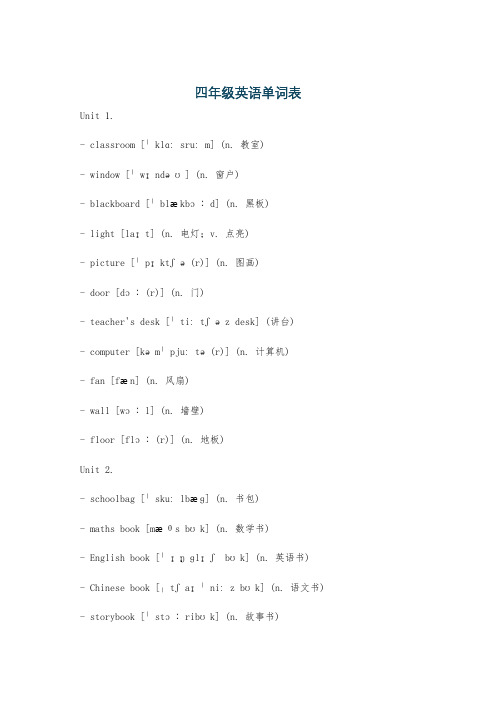
四年级英语单词表Unit 1.- classroom [ˈklɑːsruːm] (n. 教室)- window [ˈwɪndəʊ] (n. 窗户)- blackboard [ˈblækbɔːd] (n. 黑板)- light [laɪt] (n. 电灯;v. 点亮)- picture [ˈpɪktʃə(r)] (n. 图画)- door [dɔː(r)] (n. 门)- teacher's desk [ˈtiːtʃəz desk] (讲台)- computer [kəmˈpjuːtə(r)] (n. 计算机)- fan [fæn] (n. 风扇)- wall [wɔːl] (n. 墙壁)- floor [flɔː(r)] (n. 地板)Unit 2.- schoolbag [ˈskuːlbæɡ] (n. 书包)- maths book [mæθs bʊk] (n. 数学书)- English book [ˈɪŋɡlɪʃ bʊk] (n. 英语书)- Chinese book [ˌtʃaɪˈniːz bʊk] (n. 语文书) - storybook [ˈstɔːribʊk] (n. 故事书)- candy [ˈkændi] (n. 糖果)- notebook [ˈnəʊtbʊk] (n. 笔记本)- toy [tɔɪ] (n. 玩具)- key [kiː] (n. 钥匙)Unit 3.- strong [strɒŋ] (adj. 强壮的)- friendly [ˈfrendli] (adj. 友好的)- quiet [ˈkwaɪət] (adj. 安静的)- hair [heə(r)] (n. 头发)- shoe [ʃuː] (n. 鞋)- glasses [ˈɡlɑːsɪz] (n. 眼镜)- his [hɪz] (pron. 他的)- her [hɜː(r)] (pron. 她的)Unit 4.- bedroom [ˈbedruːm] (n. 卧室)- living room [ˈlɪvɪŋ ruːm] (n. 客厅) - study [ˈstʌdi] (n. 书房;v. 学习)- kitchen [ˈkɪtʃɪn] (n. 厨房)- bathroom [ˈbɑːθruːm] (n. 浴室)- bed [bed] (n. 床)- phone [fəʊn] (n. 电话)- table [ˈteɪbl] (n. 桌子)- sofa [ˈsəʊfə] (n. 沙发)- fridge [frɪdʒ] (n. 冰箱)Unit 5.- beef [biːf] (n. 牛肉)- chicken [ˈtʃɪkɪn] (n. 鸡肉)- noodles [ˈnuːdlz] (n. 面条)- soup [suːp] (n. 汤)- vegetable [ˈvedʒtəbl] (n. 蔬菜)- chopsticks [ˈtʃɒpstɪks] (n. 筷子)- bowl [bəʊl] (n. 碗)- fork [fɔːk] (n. 叉子)- knife [naɪf] (n. 刀)- spoon [spuːn] (n. 勺子)Unit 6.- parents [ˈpeərənts] (n. 父母)- cousin [ˈkʌzn] (n. 堂兄弟姊妹;表兄弟姊妹)- uncle [ˈʌŋkl] (n. 叔叔;伯伯;舅舅;姑父;姨父) - aunt [ɑːnt] (n. 阿姨;姑妈;伯母;舅妈)- baby brother [ˈbeɪbi ˈbrʌðə(r)] (婴儿小弟弟) - doctor [ˈdɒktə(r)] (n. 医生)- cook [kʊk] (n. 厨师;v. 做饭)- driver [ˈdraɪvə(r)] (n. 司机)- farmer [ˈfɑːmə(r)] (n. 农民)- nurse [nɜːrs] (n. 护士)。
四年级英语单词

四年级英语单词Module 1nice[nais]友好的,亲切的clever['klevə] 聪明的naughty['nɔ:ti] 淘气的a bit 有一点shy[ʃai] 害羞的answer['ɑ:nsə]接(电话)call[kɔːl] 电话,打电话bad[bæd] 不好的,坏的cool[ku:l] 酷的aunt[ɑ:nt] 阿姨;姑妈;伯母uncle['ʌŋkl] 叔叔,伯伯,舅父big [big] 年龄较大的little['litl] 小的,年幼的cute[kju:t] 可爱的Module 2city['siti] 城市ship[ʃip] 船beautiful['bju:təfəl]美丽的whose[hu:z] 谁的queen[kwi:n] 女王close[kləʊs] 近的,接近的old[əuld] 古老的famous['feiməs]著名的Module 3robot['rəubɔt] 机器will [wil] 将,将会everything['evriθiŋ]所有事情one day (将来)有一天housework['hauswə:k]家务learn[lə:n] 学习our['auə] 我们的homework['həumwə:k]家庭作业won't[wəʊnt]=will not 将不会Monday['mʌndei]星期一Tuesday['tju:zdi]星期二Wednesday['wenzdi]星期三Thursday['θə:zdi]星期四Friday['fraidi]星期五Saturday['sætədi]星期六Sunday['sʌndi]星期日have[hæv] 有,拥有next[nekst] 下一个的week[wi:k] 星期,周holiday['hɒlidei] 假期Module 4take[teik] 带走,拿走,fly[flai] 飞picnic['piknik] 野餐great[greit] 太好了why[wai] 为什么Why not为什么不呢?because[bi'kɔ:z] 因为so[səu] 所以cloudy['klaʊdi] 多云的weather['weðə] 天气Module 5was[wɒz] 是(am/is的过去式)then[ðen]当时,那是grandparent(外)祖父(母)['grænd,pɛərənt]were[wə]是,(are的过去式)young[jʌŋ] 年轻的old[əuld] 年长的hair[hɛə] 头发so[səu] 这么,那么short[ʃɔ:t] 短的long[lɔŋ] 长的wasn’t=was not不是weren’t=were not不是clean[kli:n] 干净的dirty['dɜ:ti] 脏的Module 6yesterday['jestədei] 昨天out [aʊt] 不在家well[wel] 健康的thanks[θæŋks] 谢谢sun[sʌn] 太阳lesson['lesn] 一堂课village['vilidʒ] 乡村Module 7had[hæd]( have的过去式)度过phone[fəun] 打电话cook[kuk] 烹饪,烧(菜)really['riəli] 真的wash[wɒʃ] 洗what[wɒt] about[ə'baut]…?…怎么样?did[did](do的过去式)助动词didn’t=did not 没有computer[kəm'pju:tə]计算机;电脑love[lʌv] 爱,喜欢him[him] 他(宾格)Mrs['misiz] 太太;夫人Miss[mis] 小姐Module 8sang[sæŋ] 唱歌beautifully['bju:təfli] 优美地saw [sɔː]( see的过去式)看见game[geim] 游戏;比赛last[lɑ:st] 最近过去的fun[fʌn] 有趣的事went[went] (go的过去式)去…there[ðeə] 在那儿ate[et] 吃(eat的过去式)dra nk[dræŋk]喝(drink的过去式)time[taim] 一段时间have a good time玩得开心busy['bizi] 忙碌的took[tʊk]拍摄(take的过去式tell[tel] 告诉great[greit] 非常好的delicious[di'liʃəs]美味的;可口的made[meid]做,制成(make的过去式)poster['pəʊstə] 海报,招贴画Module 9welcome['welkəm] 欢迎postcard['pəʊskɑːd]明信片cousin['kʌzn]堂兄弟姊妹;表兄弟姊妹dear[diə] 亲爱的on holiday['hɒlidei]在休假travel['trævl] 旅行came[keim]come的过去式来pop[pɒp] 流行音乐concert['kɒnsət] 音乐会earth[ɜːθ] 地球Module 10fall [fɔːl]掉下,落下fall off 跌落fell [fel](fall的过去式)掉下,落下fall down 摔倒,跌倒found[faʊnd] 发现,找到town[taʊn] 城镇,市镇happen['hæpən] 发生ride[raid] 骑,乘then[ðen] 然后thirsty['θə:sti] 口渴water['wɔ:tə] 水bought[bɔ:t] (buy)买watermelon['wɔ:tə,melən] 西瓜carried['kærid] (carry的过去式)拿,搬bump[bʌmp] 磕、碰hospital['hɒspitl] 医院had[hæd]( have的过去式)吃,喝chocolate['tʃɒklət] 巧克力stomachache['stʌməkeik] 胃疼cold[kəuld] 感冒headache['hedeik] 头疼fever['fi:və] 发烧。
四年级小学英语单词
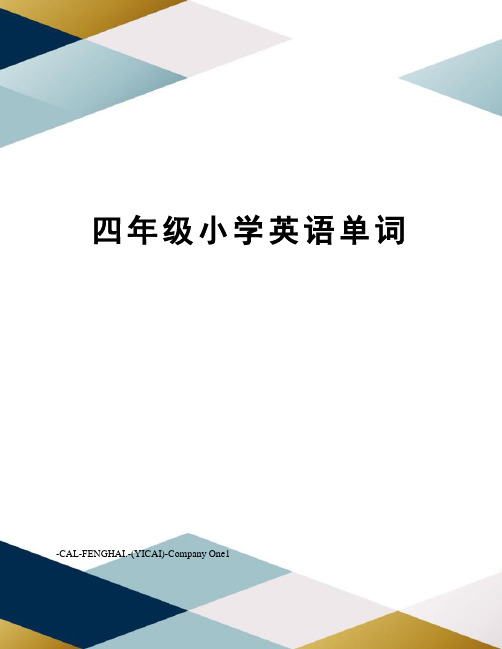
四年级小学英语单词-CAL-FENGHAI.-(YICAI)-Company One1小学英语单词分类大全完美打一、学习用品(school things)pen /pen/ 钢笔pencil /'pensl/ 铅笔pencil-case /'penslkeis / 铅笔盒ruler /'ru:lə/ 尺子book /buk/ 书bag /bæg/ 包post card /pəust kɑ:d/ 明信片newspaper /'nju:z,peipə/ 报纸schoolbag /sku:lbæg/ 书包eraser / i'reisə / 橡皮crayon / 'kreiən / 蜡笔sharpener / 'ʃɑ:pənə / 卷笔刀story-book / 'stɔ:ri] buk / 故事书notebook / 'nəutbuk / 笔记本Chinese book / 'tʃai'ni:z / 语文书English book / 'iŋgliʃ / 英语书maths book / mæθs / 数学书magazine / ,mægə'zi:n / 杂志newspaper / 'nju:z,peipə / 报纸dictionary / 'dikʃəneri / 词典身体部位(body)foot / fut / 脚head / hed / 头face / feis / 脸hair / hɛə / 头发nose / nəuz / 鼻子mouth / mauθ / 嘴eye / ai / 眼睛ear / iə / 耳朵arm / ɑ:m / 手臂hand / hænd / 手 finger / 'fiŋgə / 手指 leg / leg / 腿tail / teil / 尾巴三、颜色(colours)red /red/ 红blue /blu:/ 蓝yellow /'jeləu/ 黄green /gri:n/ 绿white /wait/ 白black /blæk/ 黑pink /piŋk/ 粉红purple /'pə:pl/ 紫orange /'ɔ:rindʒ/ 橙brown /braun/ 棕四、动物(animals)cat /kæt/ 猫dog /dɔg/ 狗pig /pig/ 猪duck /dʌk/ 鸭rabbit /'ræbit/ 兔子horse /hɔ:s/ 马elephant /'elifənt/ 大象 ant /ænt/ 蚂蚁fish /fiʃ/ 鱼bird /bə:d/ 鸟snake /sneik/ 蛇mouse /maus/ 鼠monkey /'mʌŋki/ 猴子panda /'pændə/ 熊猫bear /bɛə/ 熊lion /'laiən/ 狮tiger /'taigə/ 老虎fox /fɔks/ 狐狸deer /diə/ 鹿giraffe /dʒi'rɑ:f/ 长颈鹿goose /gu:s/ 鹅hen /hen/ 母鸡sheep /ʃi:p/ 绵羊cow /kau/ 奶牛五、人物(people)friend /frend/ 朋友boy / bɔi / 男孩girl /gə:l/ 女孩mother /'mʌðə/ 母亲father /'fɑ:ðə/ 父亲sister /'sistə/ 姐妹brother /'brʌðə/ 兄弟uncle /'ʌŋkl/ 叔叔man /mæn/ 男人woman/ 'wumən/女人Mr先生 Miss小姐lady /'leidi/ 女士mom /mɔm/ 妈妈dad /dæd/ 爸爸parents /'pɛərənts/ 父母grandma /'grændmɑ:/ grandmother /'grænd,mʌðə/(外)祖母grandpa /'grændpɑ:/grandfather /'grænd,fɑ:ðə/(外)祖父aunt /ɑ:nt/ 阿姨cousin /'kʌzn/ 堂兄妹son /sʌn/ 儿子baby /'beibi/ 婴儿kid /kid/小孩六、职业(job)teacher /'ti:tʃə/ 教师student /'stju:dənt/学生doctor /'dɔktə/ 医生nurse /nə:s/ 护士driver /'draivə / 司机farmer /'fɑ:mə/ 农民singer /'siŋə/ 歌唱家writer /'raitə/ 作家artist /'ɑ:tist /画家actor /'æktə/男演员actress/'æktris/女演员TV reporter /ri'pɔ:tə/ 电视台记者七、食品(food and drink:)breakfast /'brekfəst / 早餐lunch /lʌntʃ/ 中餐dinner /'dinə/ 晚餐egg /eg/ 鸡蛋rice /rais/ 米饭cake /keik/ 蛋糕bread /bred/ 面包jam /dʒæm/ 果酱biscuit /'biskit/ 饼干sandwich /'sændwitʃ/ 三明治dumplings /'dʌmpliŋ/ 饺子meat/mi:t/肉chicken /'tʃikin/ 鸡肉beef /bi:f/ 牛肉fish /fiʃ/ 鱼hamburger /'hæmbə:gə/ 汉堡hot dog /hɔt dɔg/ 热狗noodles /'nu:dl/ 面条soup /su:p/ 汤milk /milk/牛奶water /'wɔ:tə/水ice-cream/ais kri:m/冰淇淋cola/'kəulə/可乐juice /dʒu:s/ 果汁tea /ti:/ 茶coffee /'kɔfi/ 咖啡fruit/fru:t/ 水果apple /'æpl / 苹果banana / bə'nɑ:nə / 香蕉pear /pɛə / 梨orange /'ɔ:rindʒ / 橙watermelon /'wɔ:tə,melən / 西瓜grape / greip / 葡萄cherry/'tʃeri / 樱桃lemon/ 'lemən / 柠檬mango/ 'mæŋgəu /芒果peach /pi:tʃ/ 桃strawberry / 'strɔ:bəri / 草莓vegetable / 'vedʒitəbl / 蔬菜green beans / gri:n bi:ns / 青豆tomato / tə'meitəu / 西红柿potato / pə'teitəu / 土豆onion / 'ʌnjən / 洋葱pea / pi:/ 豌豆carrot / 'kærət / 胡萝卜cabbage /'kæbidʒ / 卷心菜衣服(clothes)jacket /'dʒækit/ 夹克衫shirt /ʃə:t/ 衬衫T-shirt T恤衫skirt /skə:t/ 短裙子dress /dres/ 连衣裙jeans /dʒi:nz/ 牛仔裤pants /pænts/(可指任何裤子) trousers /'trauzəz / 长裤socks /sɔks/ 袜子shoes /ʃu:z/ 鞋子sweater /'swetə/ 毛衣coat /kəut/ 外套raincoat /'reinkəut/ 雨衣shorts /ʃɔ:ts/ 短裤boots /bu:ts/ 靴子hat /hæt/ 有边帽cap /kæp/ 无边帽tie /tai/ 领带sunglasses /'sʌnglɑ:siz/太阳镜scarf /skɑ:f/ 围巾gloves /glʌvz/手套九、交通工具(vehicles)bike /baik/ 自行车bus /bʌs/ 公共汽车train /trein/ 火车boat /bəut/ 小船ship /ʃip/ 轮船car /kɑ:/ 小汽车taxi /'tæksi/出租车plane /plein/飞机subway /'sʌbwei/地铁十、杂物(other things)window /'windəu/ 窗户door /dɔ:/ 门desk /desk/ 课桌chair /tʃɛə/ 椅子bed /bed/ 床computer/kəm'pju:tə/计算机board /bɔ:d/ 写字板fan /fæn/ 风扇light /lait/ 灯mirror /'mirə/ 镜子teacher’s desk / 'ti:tʃə desk/ 讲台picture /'piktʃə/ 图画photo /'fəutəu/ 照片wall /wɔ:l/ 墙壁floor /flɔ:/ 地板football /'futbɔ:l/ 足球present / 'preznt / /gift / gift / 礼物walkman / 'wɔ:kmən / 随身听lamp /læmp/ 台灯phone /fəun/ 电话sofa /'səufə/ 沙发shelf /ʃelf/ 书架fridge /fridʒ/ 冰箱table /'teibl/ 桌子key /ki:/ 钥匙lock /lɔk/ 锁plate /pleit/ 盘子knife /naif/ 刀fork /fɔ:k/ 叉spoon /spu:n/ 勺子chopsticks /'tʃɔpstiks/ 筷子pot /pɔt/ 锅toy /tɔi/ 玩具doll /dɔl/ 洋娃娃ball /bɔ:l/ 球balloon /bə'lu:n/ 气球kite /kait/ 风筝jigsaw puzzle /'dʒigsɔ: 'pʌzl/拼图游戏box /bɔks/ 盒子umbrella /ʌm'brelə/ 伞十一、地点(locations)home /həum/ 家room /ru:m/ 房间bedroom /'bedrum/ 卧室bathroom /'bæθrum/卫生间living room / 'liviŋ ru:m / 起居室/客厅kitchen /'kitʃin/ 厨房classroom /'klɑ:srum/ 教室school /sku:l/ 学校park /pɑ:k/ 公园library /'laibrəri/ 图书馆post office /pəust 'ɔ:fis/ 邮政局farm /fɑ:m/ 农场zoo /zu:/ 动物园garden /'gɑ:dn/ 花园playground /'pleigraund/ 操场canteen /kæn'ti:n/ 餐厅teacher’s office /'ɔ:fis/ 教师办公室gym /dʒim/ 体育馆art room /ɑ:t ru:m/ 美术室computer room /kəm'pju:tə/ 电脑房music room /'mju:zik/ 音乐教室TV room电视房city /'siti/ 城市十二、气象(weather)cold /kəuld/ 冷的hot /hɔt/ 热的warm /wɔ:m/ 温暖的cool /ku:l/ 凉爽的snowy /snəui/下雪的sunny /'sʌni/晴朗的rainy /'reini/ 下雨windy /'windi/ 刮风的cloudy /'klaudi/ 多云的weather report /'weðə ri'pɔ:t/ 天气预报十三、景物(nature)house /rəud/ 房子rain /rein/ 雨cloud /klaud/ 云sun /sʌn/ 太阳sky /skai/ 天空rainbow /'reinbəu/ 彩虹wind /waind/风air /ɛə/ 空气十四、植物(plants)flower /'flauə/ 花grass /grɑ:s/ 草tree /tri:/树leaf /li:f/树叶二十、数词(number)one two threefour five sixseven eight nineten eleven twelve thirteen fourteen fifteen sixteen seventeen eighteen nineteentwenty二十 thirty三十forty四十 fifty五十sixty六十 seventy七十eighty八十 ninety九十hundred /'hʌndrəd/ 一百first第一 second第二 third第三二十一、形容词(adj.) big /big/大的small/smɔ:/小的long/ lɔŋ/长的tall/tɔ:l/高的short/ʃɔ:t/短的young/jʌŋ/年轻的old/əuld/老的strong/strɔŋ/强壮的thin/θin/瘦的quiet/'kwaiət/安静的nice/nais /好的kind/kaind/善良的funny/'fʌni/滑稽的sweet/swi:t/甜的fresh/freʃ/新鲜clean/kli:n/干净的tired/'taiəd/累的angry/'æŋgri/生气的happy/'hæpi/高兴的sad/sæd/难过的fine/fain/好的great/greit/棒的new/nju:/新的fat/fæt/胖的right /rait/对的hungry/'hʌŋgri/饿的cute/kju:t/可爱的little/'litl/小的beautiful/'bju:təfəl/漂亮的colourful/'kʌləful/五颜六色的pretty/'priti/漂亮的cheap/tʃi:p/便宜的expensive/iks'pensiv/贵的high/hai/高的easy/'i:zi/简单的二十二、介词(prep.)in在……里面on 在……上面under/'ʌndə/在……下面near /niə/在……附近behind/bi'haind/在……后面next to 在……旁边over/'əuvə/悬在……上面in front of/frʌnt/在……前面二十三、代词(pron.)I/ai/我 we/wi:/我们you/ju:/你,你们he/hi:/他 she/ʃi:/她 it/it/它they/ðei/他们my/mai/我的our/'auə/我们的your/juə/你的,你们的his/hiz/他的her/hə:/她的二十四、动词(verb.)play/plei/玩swim/swim/游泳fly/flai/飞jump/dʒʌmp/跳walk/wɔ:k/走run/rʌn/跑climb/klaim/爬swing/swiŋ/荡秋千eat/i:t/吃sleep/sli:p/睡觉like/laik/喜欢have/hæv/有buy/bai/买take/teik /拍(照),带live/liv/居住teach/ti:tʃ/教go/gəu/去study/'stʌdi/学习learn/lə:n/学习sing/siŋ/唱歌dance/dɑ:ns/跳舞meet/mi:t/ 遇见welcome/'welkəm/ 欢迎thank /θæŋk/ 谢谢work /wə:k/ 工作drink /driŋk/ 喝taste /teist/ 尝smell /smel/ 闻feed /fi:d/ 喂milk /milk/ 挤牛奶look /luk/ 看guess /ges/ 猜help /help/ 帮助pass/pɑ:s/ 传递show/ʃəu/展示,给……看use /ju:z/ 用clean /kli:n/ 打扫open/'əupən/ 打开close /kləuz/ 关put /put/ 放read /ri:d/ 读,看write /rait/ 写paint /peint/ 画画tell /tel/ 告诉kick /kik/ 踢ride /raid/ 骑stop /stɔp/ 停wait /weit/ 等find /faind/ 找drive /draiv/ 驾驶fold /fəuld/ 折叠send /send/送,寄wash /wɔʃ/ 洗shine/ʃain/照耀become/bi'kʌm/变成feel /fi:l/ 感觉think /θiŋk/ 想fall /fɔ:l/ 掉下leave /li:v/ 离开read books读书do homework做作业watch TV /wɔtʃ/ 看电视cook the meals /kuk mi:l/ 烧菜water the flowers /'flauə/浇花sweep the floor /swi:p flɔ:/拖地clean the bedroom /kli:n 'bedrum/打扫房间make the bed铺床叠被set the table /'teibl/摆餐桌wash the clothes /wɔʃ kləuðz/洗衣服wash the dishes /diʃ/洗盘子use a computer /kəm'pju:tə/用电脑do morning exercises/'mɔ:niŋ 'eksəsaiz/做早操eat breakfast /i:t 'brekfəst/吃早餐eat dinner /'dinə /吃晚饭go to school去上学have English class上英语课play sports/plei spɔ:ts/体育运动get up起床climb mountains/klaim 'mauntins/爬山go shopping去购物play the piano /pi'ænəu/ 弹钢琴visit grandparents/'vizit 'grænd,pɛərənt/拜访祖父母go hiking /haik/ 去远足fly kites /flai kaits/ 放风筝make a snowman/meik ə 'snəu,mæn/堆雪人plant trees /plɑ:nt tri:z/ 植树draw pictures /drɔ: 'piktʃəz/画画cook dinner /kuk 'dinə/烧晚饭read a book 读书answer the phone/'ɑ:nsə fəun /接电话listen to music /'lisn 'mju:zik/听音乐clean the room打扫房间write a letter /rait 'letə/ 写信write an e-mail写电子邮件drink wat er /driŋk 'wɔ:tə/ 喝水take pictures /teik 'piktʃə/ 拍照片pick up leaves /pik ʌp li:vz/ 摘树叶write a report /rait ri'pɔ:t/ 写报告play chess /tʃes/ 下棋have a picnic /'piknik/ 野餐get to到达ride a bike /raid baik/ 骑自行车play the violin /,vaiə'lin/ 拉小提琴collect stamps /kə'lekt stæmp/ 集邮wake up/weik ʌp/醒过来put on穿上take off 脱下hang up /hæŋ ʌp/ 挂起来wear /wɛə/ 穿go home回家go to bed去睡觉play computer games/kəm'pju:tə geims/玩电脑游戏play chess /tʃes/ 下棋do housework /'hauswə:k/ 做家务empty the trash/'empti træʃ/倒垃圾put away the clothes /kləuð/放好衣服get off下车take a trip/trip/去郊游read a magazine /,mægə'zi:n/读杂志go to the cinema /'sinimə/去电影院二十五、疑问词what什么what colour什么颜色what time几点what day星期几how怎样how old年龄多大、几岁how many多少how much 多少钱how tall多高how heavy多重how long多长how big多大how large /hau lɑ:dʒ/ 面积多大who/hu:/ 谁when/hwen/什么时候whose/hu:z/ 谁的where/hwɛə/在哪里why/hwai/为什么which /hwitʃ/ 哪一个。
四年级英语短语100个
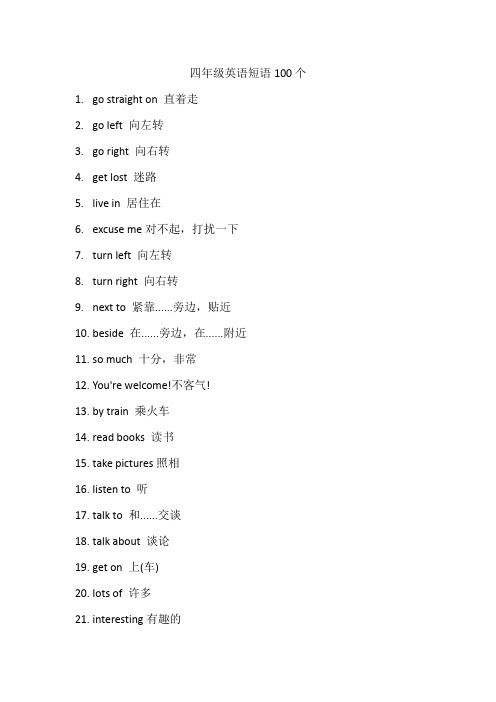
四年级英语短语100个1.go straight on 直着走2.go left 向左转3.go right 向右转4.get lost 迷路5.live in 居住在6.excuse me对不起,打扰一下7.turn left 向左转8.turn right 向右转9.next to 紧靠......旁边,贴近10.beside 在......旁边,在......附近11.so much 十分,非常12.You're welcome!不客气!13.by train 乘火车14.read books 读书15.take pictures照相16.listen to 听17.talk to 和......交谈18.talk about 谈论19.get on 上(车)20.lots of 许多21.interesting有趣的22.dragon boat龙舟23.between a and b在......之间,在中间24.play chess下国际象棋25.soya milk豆浆26.Me too 我也一样27.fast food 快餐28.How much 多少钱?29.sorry 抱歉,对不起30.turn on 打开31.the Mid-Autumn Festival 中秋节32.moon cake 月饼33.of course 当然34.there is 有,存在35.there are 有,存在36.have a look 看一看37.get up起床38.swim suit 游泳衣39.go fishing 去钓鱼40.sports day 运动日41.good luck 祝你好运e on 加油43.high jump 跳高44.long jump 跳远45.How about 怎么样46.New Year 新年47.the Spring Festival 春节48.l see. 我明白了49.Merry Christmas! 圣诞快乐!50.all right 还不错地,令人满意地51.as...as 尽可能......的52.here it is 在这里53.under the table 在桌子下面54.look at 看55.fly a kite 放风筝56.ride a bike 骑自行车57.play football 踢足球58.play basketball 打篮球59.happy birthday 生日快乐60.climbing a tree 爬树61.ride a horse 骑马62.a bit 稍微有点儿63.did not=didn't 没有64.fall off 跌伤65.fall off 跌落66.fall down 摔倒;坍塌67.on holiday 在休假,在度假68.one day (将来)有一天69.stomach ache胃痛70.have a good time玩的开心71.what about ......怎么样?72.Big Ben 大本钟73.the Great Wall 长城74.West Lake西湖75.look after 照顾76.the next day 第二天77.why not?为什么不呢?78.be out 出去了,不在家79.in the sun 在阳光下80.at home 在家81.row a boat 划船82.on the lake 在湖面上83.wash clothes 洗衣服84.watch TV 看电视85.talk with 和谁交谈86.on Sunday在星期天87.play table tennis 打乒乓球88.have a picnic 野餐89.by bus乘坐公交车90.play games 玩游戏91.by bike 骑自行车92.go to school 上学93.make a poster 制作海报94.go swimming 去游泳95.listen to music 听音乐96.by plane乘坐飞机st week 上周98.what happened 发生了什么?99.all the day 整天100.have a cold 感冒。
四年级英语知识点归纳
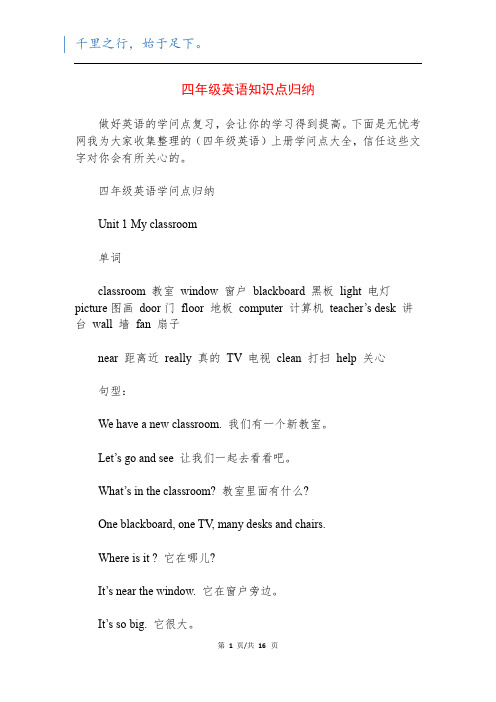
四年级英语知识点归纳做好英语的学问点复习,会让你的学习得到提高。
下面是无忧考网我为大家收集整理的(四年级英语)上册学问点大全,信任这些文字对你会有所关心的。
四年级英语学问点归纳Unit 1 My classroom单词classroom 教室window 窗户blackboard 黑板light 电灯picture图画door门floor 地板computer 计算机teacher’s desk 讲台wall 墙fan 扇子near 距离近really 真的TV 电视clean 打扫help 关心句型:We have a new classroom. 我们有一个新教室。
Let’s go and see 让我们一起去看看吧。
What’s in the classroom? 教室里面有什么?One blackboard, one TV, many desks and chairs.Where is it ? 它在哪儿?It’s near the window. 它在窗户旁边。
It’s so big. 它很大。
Let’s clean the classroom. 让我们一起打扫教室吧。
Let me clean the windows. . 让我来擦窗户。
Look! This is the new classroom. The door is orange.(看!这是新的教室。
门是橙色的。
)(短语):1.地点类:on the wall在墙上near the window在窗户旁边in the classroom在教室里on the fan在风扇上near the computer在计算机旁边动作类:clean the desks and chairs 清洁桌椅clean the windows擦窗户clean the fish bowl清理鱼缸open the door开门turn on the light开灯sweep the floor扫地put up the picture张帖图画clean the classroom打扫教室clean the teacher’s desk 清洁讲台close the window 关窗Turn on the light 开灯put up the picture 挂图画clean the blackboard 擦黑板其他类:a new classroom一间新教室excuse me 劳驾,对不起语法点:where 引导的是特别疑问句,“哪里”,看到where 就要想到地点,方位词,例如on, in ,under, near等语法点:let’s = let us 让我们; let me 让我(文化)学问:.想问别人问题,要先说“excuse me对不起,打搅一下。
四年级英语单词表
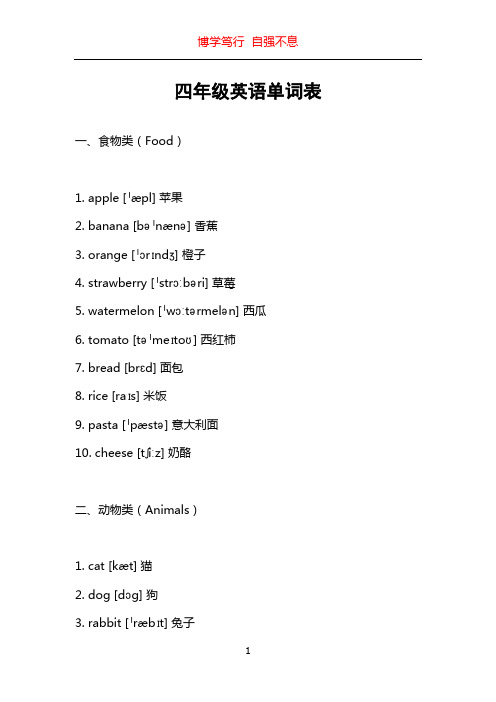
四年级英语单词表一、食物类(Food)1. apple [ˈæpl] 苹果2. banana [bəˈnænə] 香蕉3. orange [ˈɔrɪndʒ] 橙子4. strawberry [ˈstrɔːbəri] 草莓5. watermelon [ˈwɔːtərmelən] 西瓜6. tomato [təˈmeɪtoʊ] 西红柿7. bread [brɛd] 面包8. rice [raɪs] 米饭9. pasta [ˈpæstə] 意大利面10. cheese [tʃiːz] 奶酪二、动物类(Animals)1. cat [kæt] 猫2. dog [dɔɡ] 狗3. rabbit [ˈræbɪt] 兔子4. panda [ˈpændə] 熊猫5. lion [ˈlaɪən] 狮子6. tiger [ˈtaɪɡər] 老虎7. elephant [ˈɛlɪfənt] 大象8. giraffe [dʒɪˈræf] 长颈鹿9. monkey [ˈmʌŋki] 猴子10. butterfly [ˈbʌtərflaɪ] 蝴蝶三、颜色类(Colors)1. red [rɛd] 红色2. blue [bluː] 蓝色3. yellow [ˈjɛloʊ] 黄色4. green [ɡriːn] 绿色5. orange [ˈɔrɪndʒ] 橙色6. purple [ˈpɜrpl] 紫色7. pink [pɪŋk] 粉色8. brown [braʊn] 棕色9. black [blæk] 黑色10. white [waɪt] 白色四、家庭成员(Family Members)1. father [ˈfɑːðər] 父亲2. mother [ˈmʌðər] 母亲3. brother [ˈbrʌðər] 兄弟4. sister [ˈsɪstər] 姐妹5. grandfather [ˈɡrændˌfɑðər] 爷爷6. grandmother [ˈɡrændˌmʌðər] 奶奶7. uncle [ˈʌŋkl] 叔叔8. aunt [ænt] 阿姨9. cousin [ˈkʌzn] 堂兄弟姐妹10. family [ˈfæməli] 家庭五、学校用品(School Supplies)1. pencil [ˈpɛnsəl] 铅笔2. pen [pɛn] 钢笔3. notebook [ˈnoʊtˌbʊk] 笔记本4. ruler [ˈruːlər] 尺子5. eraser [ɪˈreɪsər] 橡皮6. pencil case [ˈpɛnsəl keɪs] 铅笔盒7. backpack [ˈbækˌpæk] 书包8. glue [ɡluː] 胶水9. scissors [ˈsɪzərz] 剪刀10. calculator [ˈkælkjʊˌleɪtər] 计算器六、交通工具(Transportation)1. car [kɑːr] 小汽车2. bus [bʌs] 公交车3. bicycle [ˈbaɪsɪkəl] 自行车4. train [treɪn] 火车5. airplane [ˈɛrˌpleɪn] 飞机6. ship [ʃɪp] 船7. taxi [ˈtæksi] 出租车8. motorcycle [ˈmoʊtərˌsaɪkəl] 摩托车9. subway [ˈsʌbˌweɪ] 地铁10. helicopter [ˈhɛlɪˌkɑptər] 直升机以上是四年级常见的英语单词表,可以帮助学生打下英语学习的基础。
PEP四年级英语单词全
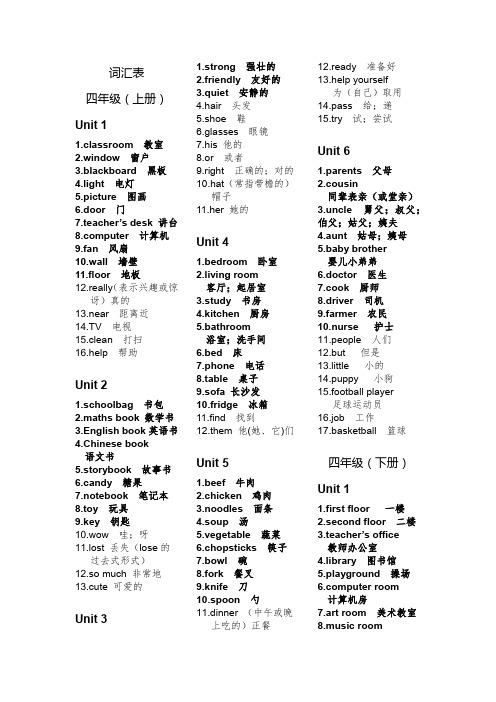
词汇表四年级(上册)Unit 11.classroom 教室2.window 窗户3.blackboard 黑板4.light 电灯5.picture 图画6.door 门7.teacher’s desk 讲台puter 计算机9.fan 风扇10.wall 墙壁11.floor 地板12.really(表示兴趣或惊讶)真的13.near 距离近 电视15.clean 打扫16.help 帮助Unit 21.schoolbag 书包2.maths book 数学书3.English book英语书4.Chinese book语文书5.storybook 故事书6.candy 糖果7.notebook 笔记本8.toy 玩具9.key 钥匙10.wow 哇;呀11.lost 丢失(lose的过去式形式)12.so much 非常地13.cute 可爱的Unit 3 1.strong 强壮的2.friendly 友好的3.quiet 安静的4.hair 头发5.shoe 鞋6.glasses 眼镜7.his 他的8.or 或者9.right 正确的;对的10.hat(常指带檐的)帽子11.her 她的Unit 41.bedroom 卧室2.living room客厅;起居室3.study 书房4.kitchen 厨房5.bathroom浴室;洗手间6.bed 床7.phone 电话8.table 桌子9.sofa 长沙发10.fridge 冰箱11.find 找到12.them 他(她、它)们Unit 51.beef 牛肉2.chicken 鸡肉3.noodles 面条4.soup 汤5.vegetable 蔬菜6.chopsticks 筷子7.bowl 碗8.fork 餐叉9.knife 刀10.spoon 勺11.dinner (中午或晚上吃的)正餐12.ready 准备好13.help yourself为(自己)取用14.pass 给;递15.try 试;尝试Unit 61.parents 父母2.cousin同辈表亲(或堂亲)3.uncle 舅父;叔父;伯父;姑父;姨夫4.aunt 姑母;姨母5.baby brother婴儿小弟弟6.doctor 医生7.cook 厨师8.driver 司机9.farmer 农民10.nurse 护士11.people 人们12.but 但是13.little 小的14.puppy 小狗15.football player足球运动员16.job 工作17.basketball 篮球四年级(下册)Unit 11.first floor 一楼2.second floor 二楼3.teacher’s office教师办公室4.library 图书馆5.playground 操场puter room计算机房7.art room 美术教室8.music room音乐教室9.next to紧邻;在…近旁10.homework 作业11.class 班;班级12.forty 四十13.way 方向Unit 21.breakfast 早餐;早饭2.English class英语课3.lunch 午餐;午饭4.music class 音乐课5.PE class 体育课6.dinner 正餐7.get up 起床8.go to school 去上学9.go home 回家10.go to bed 上床睡觉11.over 结束12.now 现在;目前13.o’clock 点钟14.kid 小孩15.thirty 三十16.hurry up 快点e on 快;加油18.just a minute稍等一会儿Unit 31.cold 寒冷的;冷的2.cool 凉的;凉爽的3.warm温暖的;暖和的4.hot 热的;烫的5.sunny 阳光充足的6.windy多风的;风大的7.cloudy 多云的8.snowy下雪(多)的9.rainy阴雨的;多雨的10.outside 在户外11.be careful 小心12.weather 天气13.New York 纽约14.how about ………怎么样?15.degree 度;度数16.world 世界17.London 伦敦18.Moscow 莫斯科19.Singapore新加坡城20.Sydney 悉尼21.fly 放(风筝等)22.love (写信结尾的热情问候语)爱你的Unit 41.tomato 西红柿2.potato 马铃薯;土豆3.green beans豆角;四季豆4.carrot 胡萝卜5.horse 马6.cow 母牛;奶牛7.sheep 羊;绵羊8.hen 母鸡9.these (this的复数形式)这些10.yum (表示味道或气味)非常好11.animal 兽;动物12.those(that的复数形式)那些13.garden 花园;菜园14.farm 农场15.goat 山羊16.eat 吃Unit 51.clothes 衣服;服装2.pants 裤子3.hat 帽子4.dress 连衣裙5.skirt 女裙6.coat 外衣7.sweater 毛衣8.sock 短袜9.shorts 短裤10.jacket 夹克衫11.shirt (尤指男士)衬衫12.yours 你的;你们的13.whose 谁的14.mine 我的15.pack 收拾(行李)16.wait 等待Unit 61.glove 手套2.scarf 围巾3.umbrella 雨伞4.sunglasses 太阳镜5.pretty 美观精致的6.expensive 昂贵的7.cheap 便宜的8.nice 好的9.try on 试穿10.size 尺码;号11.of course 当然12.too 太;过于13.just 正好;恰好14.how much 多少钱15.eighty 八十16.dollar 美元17.sale 销售18.more 更多的 我们。
四年级必背英语单词

desk桌子chair椅子blackboard黑板
bag书包book书pupil小学生
七、身体部位(12个)
head头arm胳膊leg腿
foot脚nose鼻子eye眼睛
mouth嘴巴ear耳朵knee膝盖
hand手face脸toe脚趾
八、季节(4个)
ball球today今天tomorrow明天
box盒子park公园lake湖
bedroom卧室capital首都river河流
picnic野餐homework家庭作业housework家务
robot机器人city城市party聚会
road道路hill小山house房屋
letter信件people人们friend朋友
四、职业(6个)
teacher教师doctor医生driver司机
nurse护士policeman警察farmer农民
五、服饰(6个)
dress连衣裙coat外套sweater毛线衣
T-shirtT恤cap帽子(鸭舌帽)hat帽子(四周有帽沿的帽子)Fra bibliotek六、学校(12个)
school学校classroom教室ruler尺子
biscuit饼干fruit水果food食物
apple苹果banana香蕉pear梨
orange橘子watermelon西瓜cake蛋糕
三、性别及家庭成员(12个)
man男人woman女人boy男孩
girl女孩Ms女士Mr先生
father父亲mother母亲brother兄弟
sister姐妹grandpa爷爷(外公)grandma奶奶(外婆)
四年级必背英语单词
- 1、下载文档前请自行甄别文档内容的完整性,平台不提供额外的编辑、内容补充、找答案等附加服务。
- 2、"仅部分预览"的文档,不可在线预览部分如存在完整性等问题,可反馈申请退款(可完整预览的文档不适用该条件!)。
- 3、如文档侵犯您的权益,请联系客服反馈,我们会尽快为您处理(人工客服工作时间:9:00-18:30)。
四年级上册英语教案(第3册)第1-3课时Module 1Unit 1 Go straight on.一、教学目标:情感目标:培养学生乐于助人的品质。
知识目标:学习句型Where’s West Lake Road, please? Go straight on. Turn left. Turn right. Where are you going?能力目标:培养学生问路、指路的能力。
Ⅱ教学重点;1.学习句型:Where’s …,please? Go straight on. Turn left. Turn right. Where are you going?2.掌握单词及词组:house/ go straight on/ turn left/ turn right/excuse me/ next to/ supermarketⅢ教学难点:掌握表示地点和方位的词Ⅳ辅助资源:挂图、录音机、磁带、图片、课文VCD二、教学过程:I. Warming upTPR活动。
教师边说边做:”Right hand up. Right hand down.”学生跟着教师边做边说。
II. Revision:教师出示一些表示地点的图片如park/zoo/shop/school等,请学生抢答出单词。
(通过复习地点单词为练习本课的句型Where’s …,please?做好铺垫。
)III. Presentation:教师拿出公园的图片对学生说:”I’m going to the park this weekend. Where are you going this weekend?”学生说出自己的出行计划”I’m going to….”(为课文教学创设情景)教师说:”Sam is going to Daming’s house. Where is Daming’s house? Is it in West Lake Road or East Lake Road? Let’s wactch the VCD.”学生观看课文VCD,找出答案并回答。
教师提问:”Sam asks the way to the policeman. How does he ask?”学生听课文录音,大屏幕上出示Sam的问话。
教师指导学生读句子。
所有学生来扮演Sam,教师来扮演policeman,同时在大屏幕上演示出课文中的路线图,教师边指图边讲解。
教授词组go straight on/turn left/ turn right。
教师在大屏幕上出示几种路线图如:让学生说出路线。
(通过练习及时操练重点词组。
)学生打开书,跟录音朗读课文。
分角色朗读课文。
IV. Practice:1.活动:问路。
让学生自己画一幅地图,上面有三条路,分别标有school/ zoo/ supermarket/ my house. 在地图的某处标有You’re here. 教师请学生用自己的地图进行两人小组练习,一人问路:”Where’s the zoo, please?”,另一人指路:”Go straight on and then turn left”。
(此活动目的在于巩固练习问路及指路的语句,培养学生观察和动手能力。
)2.活动:我迷路了。
教师准备一些路线图和要找的目的地单词卡。
教师将单词卡片发给一些学生,再将路线图发给另一部分学生,那单词卡片的学生作为迷路者来问路,如:”I’m lost. Where’s the park?”拿着路线图的学生帮助他们来指路。
(学生在活动中操练了问路和指路。
)V. Summary:教师说:”Today we have learned how to ask and show the way with Where’s …, please? Go straight on. Turn left. Turn right. ” We use them in the daily life.VI Homework请学生画出从家到学校的路线图并英语标注。
Unit 2 It’s at the station.一教学目标:情感目标:培养学生乐于助人的品质。
知识目标:学习句子:The train is going up/down/past the hill.能力目标:能够用英语问路和指路Ⅱ教学重点;1. 学习句型The train is going up/down/past the hill.2. 掌握单词及词组:Train/up/hill/down/past/stationⅢ教学难点:掌握表示地点和方位的词Ⅳ辅助资源:挂图、录音机、磁带、图片二、教学过程:I. Warming upTPR活动:教师或一名同学下口令turn left/hands up/hands down等,全班学生做动作。
II. Revision:请几名学生展示自己上节课画的路线图并向大家介绍从自己家到学校的路线,教师可把学生的路线图用投影放出来。
(此活动既使学生的作业得以反馈,复习了已学过的知识,又为本课的新内容做好铺垫。
)III. Presentation:1.教师准备一涨有课文背景图案的挂图,将小山、房子、学校、火车站分别贴在图上,并讲解单词hill和station。
2.出示火车图片并说:There’s a train from Beijing to our city.Where is the train going? 将火车贴在山上的位置,引导学生说出:“The train is going up the hill.板书该句子。
3.移动火车到山下的位置问:“Where is the going now?引导学生说出:“The train is going down the hill.4.同样方法讲解 It’s going past….5.呈现课文:出示课文挂图,提问学生:Where is the going now放课文录音后,学生回答问题。
(听课文之前教师先给出问题能有效的帮助学生理解课文及巩固刚学过的重点句型。
)放录音,学生边听边指出句子。
跟录音朗读课文。
IV. Practice:1.活动:火车在哪里。
教师将“hill”, ”houses”, ”school”, ”station”,图片交给学生请他们站在相应的位置。
将”train”的头饰交给另一名学生,并邀请一些学生乘坐火车。
老师请火车开动起来,并请其他同学一起说出火车经过了哪些地方。
(此活动的目的在于在活动中巩固、练习表达方位的单词。
培养学生的合作精神。
)2.完成P8练习3。
学生两人一组,学生A说出路线,学生B根据A的描述找到相应的地点。
学生A:Go straight on, turn left. It’s on your night. 学生B: Is it the supermarket? 学生A: No, it isn’t.3.活动:How can we go to Carrefour?学生以小组为单位讨论后设计出从学校到最近的一家Carrefour的路线图。
然后到前面来给全班学生讲解路线,选出最合理的一组获胜。
4. 学Chant。
教师首先播放一遍chant录音,请学生边看图边听。
学生找出生词,教师解释词义并指导学生读音。
再放录音,逐行停顿,学生边听边模仿学说。
听录音连贯跟读几次,鼓励学生加上动作。
5. 学唱歌曲。
教师首先播放一遍歌曲录音,请学生边歌词边听。
学生找出生词,教师解释词义并指导学生读音。
再放录音,逐行停顿,学生边听边学唱。
听录音连贯跟读几次,鼓励学生加上动作。
V. Summary:请学生总结今天所学的重点句子和单词。
VI Homework看P8图来描述火车所在位置。
Module 2第4.5.6课时Unit 1 She’s reading a book.教学目标1.Key sentences: This is my friend.She’s reading a book.2.Vocabulary: writing a letter, taking pictures, talking toher friends, playing with a toy train..教学重难点Aims 1, 2,3教学方法Listen, TPR, communication教学准备A recorder some cards wall chart教学过程教师活动学生活动ask Ss : “What can you see?”2.Play the tape , get the Ss write down all the numbers they hear. (Plays the tape two or three times)3.Call some individual student to say the numbers they heard.4.The teacher writes the following words on the board: is are5.Point to the words and say the words.6.Then adds the following word on the board: ‘s7. Tell the Ss that this is the short form of “is", now hav e the Ss look at their books, find these words in the story. Warmer:1. Greetings.2. Ask and answer:Who is he?Who is she?What is he doing?What is she doing?Call some Ss answer, then get them work in groups.Step1.Listen and repeat.1.Teach the new words:2. Call some Ss read and spell the words. writing a letter, taking pictures, talking tofriends, playing with a toy train..3. Practice the words more times by individual student or group.4. Have the Ss open their books, and look at the pictures in books, ask them: “Who are they?”(Daming, Lingling, Amy, Tom) “What are theydoing?”(They are talking.) “What are they talking about?”学生问好Ss repeatSs look at the picture and answer the questions5. Play the tape, get the Ss listen.6. Play the tape again, pause it after each utterance, get the Ss repeat.7. The teacher read the text again, get the Ss repeat.8. Call two Ss act the roles in text.Step2. Listen and say.1. Play the tape, stop the tape after A finishes talking. Tell the Ss they are B, they can read B’s sentences.2. Work in pairs, one is A and one is B.Step3.AB bookSs listen aCall some Ss to repeat the sentence they hear板书设计MODULE 2 Unit 1This is my friend.She’s reading a book.Unit 2 What are you doing?教学目标1. Talk about the pictures.2.Key sentences: What are you doing?I’m watching TV.3.Vocabulary: listen to, read, do my homework教学重难点What are you doing? I’m………教学准备A recorder some cards wall chart教学过程Warmer:1.Read the text of Unit 1.2.Game: Tell me more(The teacher writes the following information on the board before the lesson).She’s writing a letter.She’s taking pictures,She’s talking toher friends,She is playing with a toy train.3. Tell the Ss that I’m going to say the pictures and they have to point to the correct activities.4. Work in pairs. One say and one point.Step1. Look , listen and point.1. Get the Ss to open their books of Unit2, look at activity 1, then the teacher points to the pictures, ask the Ss: “What can yousee on the pictures?”Ss read the textSs look at the picture and answer the questions(The Ss tell the teacher what they see).3. Repeat the sentences.4. Now listen to the tape and point to pictures.Step2. Ask and answer1.Write some activities on the board, give the Ss some information about the activities.What are you doing?I’m listening to music.I’m watching TV.I’m reading a book.What is he doing?He’s reading a book.What is she doing?She is watching TV.2. Ask and answer. The teacher should give an example first.3. Work in pairs.Step3.Listen and repeat. Pay attention to the stress.Step4.Listen and chant.Step5.Finish exercises of AB book.Homework: 1.Read the words and text of Unit1.2.Recite the words of M1.Ss reapeatSs listen and pointSs practiseSs repeatSay the chant板书设计MODULE 3 Unit 2 What are you doing?What are you doing?I’m listening to music.I’m watching TV.I’m reading a book.What is he doing?He’s reading a book.What is she doing?She is watching TV.Module 3第7.8.9课时Unit1 What are they doing?教学目标1. Talking about activities in the park2.Key sentences: Present continuous:What are they doing?They are rowing a dragon boat.3.Vocabulary: let’s, get on, lots of, interesting, thing, look at, people, park, lake, row, boat, men, chess, drink, hungry教学重难点What are they doing? They are…教学准备A recorder some cards pictures教学过程Warmer:1. Greetings and review the activities:writing a letter,taking pictures,talking to friends,playing with a toy train..2. Revise the activities with the actions.(writing a letter,taking pictures,talking to friends,playing with a toy train..)3 The teacher ask the Ss: “Last lesson we learnt about the people in the park.(1)Look at the people in the park, what are they doing?(2)Look at the people on the lake,what are they doing?(3)Look at the men under the tree, what are they doing?(4)Look at the girls, what are they drinking?4. Call some Ss answer.(1)They are doing taijiquan.(2)They are rowing a dragon boat.(3)They are playing chess.(4)They are drinking soybean milk.Then point to the form on board, get the Ss say the activities on it ,and ask them “What are they doing?”Step1: Presentation1. The teacher show 4 pictures, have the Ss to describe the pictures(1)They are doing taijiquan.(2)They are rowing a dragon boat.(3)They are playing chess.(4)They are drinking soybean milk.2. Write the following sentences on board:What are they doing?They are rowing a dragon boatSs read the textSs look at the picture and answer the questions3.Teacher describe the pictures and get the Ss listen.4. Do more examples for Ss, make them understand the meaning.Step2.New lesson1.Have the Ss open their books, and listen to the tape, then find “What are they doing? They are rowing a dragon boat” in the text.2.After listen, check their answers.3.Show the cards on board , teach the new words:let’s, get on, lots of, interesting, thing, look at, people, park, lake, row, boat, men, chess, drink, hungry4.Practice the words more times by individual student and groups.5.Have the Ss find the new words in text , and underline them.Ss reapeatSs listen and point板书设计What are they doing?They are rowing a dragon boat.Unit 2 What is the elephant doing?一、教学目标(Teaching aims)1、知识目标(Knowledges aims)(1)学习单词 : running jumping(2)学习如何询问他人正在干什么及其应答。
